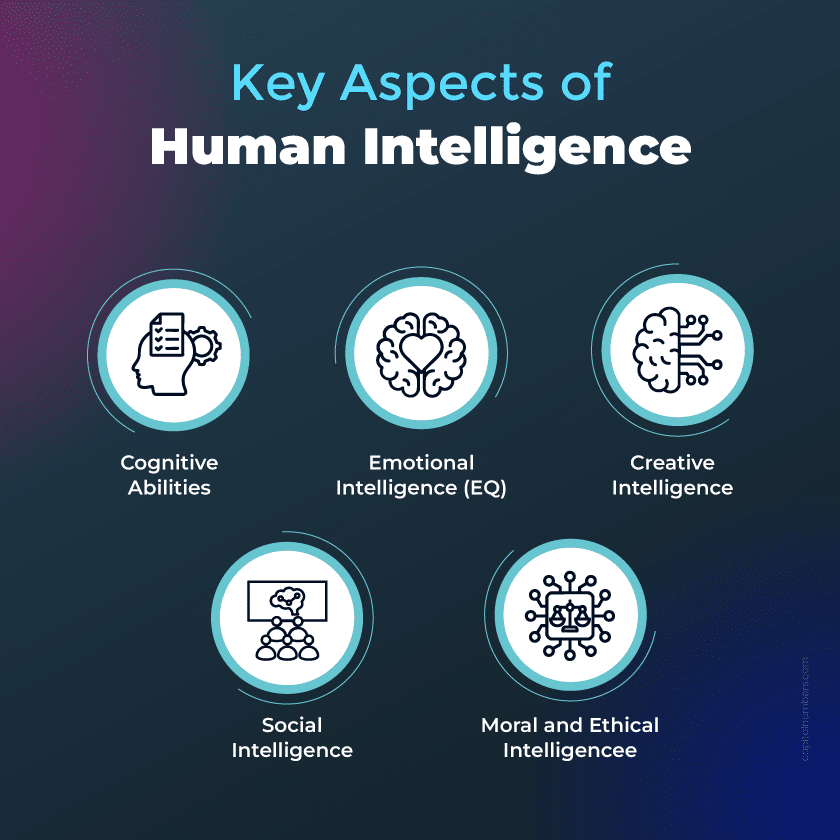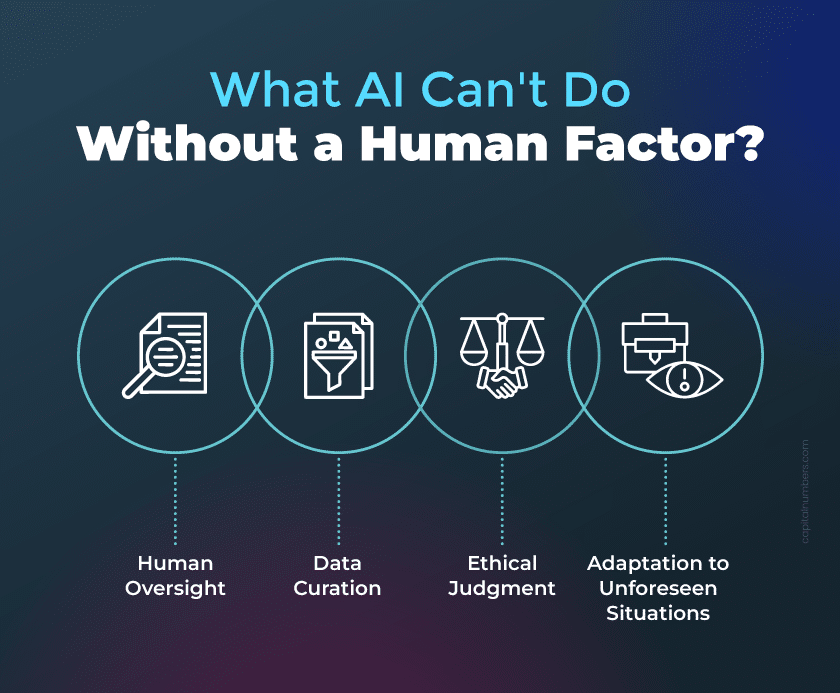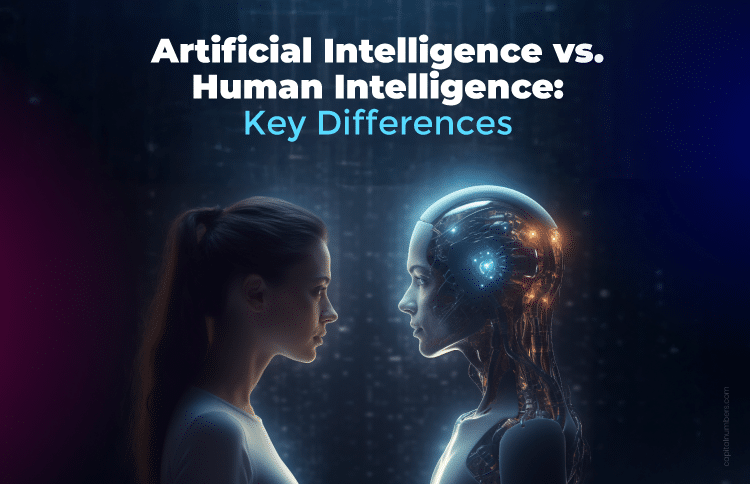Artificial Intelligence vs. Human Intelligence: Key Differences
Table of Contents
Artificial Intelligence (AI) and Human Intelligence are both incredibly powerful, but they work in very different ways. Human intelligence is all about creativity, understanding emotions, and being adaptable – skills that help us solve problems and navigate tricky situations. On the other hand, AI uses data and algorithms to process lots of information quickly, but it doesn’t have the emotional depth or creativity that humans do.
As AI continues to evolve, it’s transforming how businesses operate. With Artificial Intelligence development companies offering a range of services, organizations can now easily unlock new potential by automating tasks and gaining valuable data insights. However, the power of AI lies in its collaboration with human intelligence. By combining both, you can drive innovation, improve decision-making, and adapt more effectively to a constantly changing market.
Wondering how artificial intelligence differs from human intelligence? Want to understand the key distinctions? Read the blog to learn more.
What is Human Intelligence?
Human intelligence is our natural ability to learn new things, reason through problems, understand information, and apply that knowledge in real life. It helps us make decisions, solve problems, and connect with others. This kind of intelligence is what makes us capable of handling the world around us, from everyday tasks to complex challenges.
Key Aspects of Human Intelligence:

Human intelligence consists of various aspects. The most important ones are:
- Cognitive Abilities: These are the mental skills we use to think logically, solve problems, and make decisions. It is about how we process information and apply it to different situations.
- Emotional Intelligence (EQ): This is our ability to understand and manage our emotions, as well as recognize and relate to the emotions of others. It helps us in relationships and understand our feelings.
- Creative Intelligence: This is our ability to come up with new ideas, think differently, and make things that didn’t exist before. It is what drives innovation and artistic expression.
- Social Intelligence: This is how well we interact with others, understand social situations, and build relationships. It helps us get along with people and work in teams.
- Moral and Ethical Intelligence: This aspect is about making decisions based on what’s right and wrong, understanding the impact of our actions, and showing empathy toward others.
These five areas shape how we think, feel, and act in different situations.
What is Artificial Intelligence?
Artificial Intelligence (AI) is when machines are designed to think and learn like humans. They can solve problems, make decisions, and improve over time, just like we do. AI uses data and algorithms to understand patterns, recognize objects, and predict outcomes.
Types of AI:
AI comes in a few different types. The main ones are:
- Narrow AI (Weak AI): AI systems designed for specific tasks, like chatbots or recommendation systems. They are good at one thing but can’t do anything else.
- General AI (Strong AI): This is still a theory. It is an AI that can do any task a human can, from thinking to learning and adapting.
- Superintelligent AI: AI that could become smarter than humans in every way. This is still just an idea and hasn’t been achieved yet.
Key Technologies:
AI uses several technologies to work. These are:
- Machine Learning: This allows AI to learn from data and improve over time without being programmed for every task.
- Natural Language Processing (NLP): Natural Language Processing helps AI understand and work with human language, such as talking to you through chat or voice assistants.
- Robotics: This involves creating robots that can perform tasks on their own, often using AI to make decisions.
- Computer Vision: This lets AI understand and recognize images and videos, such as identifying objects or people in pictures.
Besides, there are various other technologies that enhance AI’s ability to perform more complex tasks.
You May Also Read: Best AI Programming Languages to Use in 2025
Key Differences Between AI and Human Intelligence
AI and human intelligence are both powerful, but they work in different ways. AI is great at specific tasks, while human intelligence is more flexible, including creativity, emotions, and the ability to adapt. Here are the main differences between AI and human intelligence:
Learning Process
- AI: AI learns from large datasets, using algorithms to recognize patterns. For example, a recommendation system like Netflix learns from your watching habits to suggest shows, but it can only suggest based on what it has learned. It cannot apply this knowledge to situations outside its training.
- Humans: Humans learn from experience, emotions, and reasoning. For example, humans can learn from reading a book and then apply that knowledge to different scenarios, even if they have never encountered them before.
Creativity and Innovation
- AI: AI can produce creative outputs by combining existing data, such as generating art or writing based on patterns. However, it does not generate original ideas or innovate on its own.
- Humans: Humans can create new ideas, designs, or solutions that have never existed before. For instance, inventing new technologies or creating original artwork involves human imagination and emotional inspiration.
Emotions and Empathy
- AI: AI can simulate emotions, like recognizing when someone is happy or sad, but it doesn’t feel or understand emotions. It can’t respond to someone’s emotional needs with genuine empathy.
- Humans: Humans are capable of emotional intelligence (EQ), meaning they can understand and relate to the emotions of others. For example, a human can comfort a friend in distress by sensing their emotions and responding appropriately.
Consciousness and Self-Awareness
- AI: AI lacks self-awareness and consciousness. It operates based on data and programming, following instructions without understanding its existence or purpose.
- Humans: Humans are self-aware and conscious, meaning they understand their thoughts and feelings. Humans reflect on their actions and learn from their experiences, shaping their personal growth.
Decision Making
- AI: AI makes decisions based on data and logic. It’s good at tasks like calculating numbers or sorting information quickly, but it lacks the ability to make moral or ethical choices. For example, AI can process thousands of transactions but can’t decide whether a decision is ethically right or wrong.
- Humans: Humans make decisions based on a mix of logic, emotions, and personal experiences. For example, when deciding whether to help someone, a human may consider their emotions, past experiences, and ethical beliefs in addition to the facts.
Adaptability and Generalization
- AI: AI is specialized for specific tasks. It excels in environments where it has enough data but struggles to handle tasks outside its trained scope. For example, a self-driving car might work well in one city but struggle with unfamiliar road conditions.
- Humans: Humans are highly adaptable and can apply learned knowledge to new situations. For example, if a person learns how to ride a bike, they can adapt their skills to ride a scooter, even though they’ve never done so before.
Speed and Accuracy
- AI: AI processes vast amounts of data quickly and accurately, especially for repetitive tasks. For example, AI can scan medical records to detect disease patterns much faster than a human could.
- Humans: Humans are slower at processing data but excel in tasks that require judgment, intuition, and understanding of context. For instance, while AI can quickly sort data, humans are better at interpreting that data in complex, ambiguous situations.
Memory and Recall
- AI: AI can store and retrieve vast amounts of information almost instantly, with no risk of forgetting or making mistakes. For example, AI can recall the details of millions of data points in seconds.
- Humans: Humans have limited memory and may forget details over time. However, they are excellent at remembering meaningful information and can prioritize what’s important based on context and emotional significance.
Problem-Solving
- AI: AI is great at solving well-defined problems with clear parameters, such as optimizing processes or predicting outcomes based on data. However, it struggles with undefined or ambiguous problems.
- Humans: Humans are skilled at solving complex, open-ended problems, often using creativity and intuition. They can navigate situations with unclear answers and apply a combination of experience and reasoning to find solutions.
Intuition
- AI: AI does not have intuition. It relies entirely on data and patterns to make decisions, but it cannot “feel” or make instinctive judgments.
- Humans: Humans have intuition, allowing them to make quick decisions based on a gut feeling or sense of the situation. For instance, a person might feel that someone is being dishonest in a conversation, even without concrete proof, and that instinct leads them to act cautiously or ask more questions.
While AI is great at processing data and handling specific tasks quickly, human intelligence shines in areas like creativity, emotions, and adaptability. AI relies on data and patterns, while humans use experience and intuition to make decisions. Together, they can work hand-in-hand to create powerful solutions and drive innovation
Can AI Replicate Human Intelligence?
You may have wondered whether AI will ever be able to replicate the full scope of human intelligence. While AI is becoming more advanced, many factors still set human intelligence apart.
Current AI Capabilities:
- AI is highly efficient in learning and problem-solving within specific tasks. It can process large amounts of data, identify patterns, and make predictions, which is reshaping businesses by automating processes and improving efficiency.
- However, AI is still far from replicating human intelligence in areas that require creativity, emotional understanding, and deeper decision-making.
Limitations of AI:
- AI lacks consciousness and self-awareness, meaning it cannot truly understand or reflect on its actions.
- While AI can simulate emotional responses, it doesn’t possess genuine emotional intelligence. It also struggles to handle situations outside its narrow training, unlike humans who can adapt their problem-solving skills to new and complex scenarios.
Theoretical Future:
- There is potential for AI to reach “general intelligence” in the future, enabling it to perform any intellectual task a human can. However, whether AI can ever achieve true human-like intelligence, including emotional depth and self-awareness, remains uncertain and is still debatable.
While AI continues to advance, it still has a long way to go before it can fully replicate the depth and complexity of human intelligence.
What AI Can’t Do Without a Human Factor?

While AI is a powerful tool, there are several important aspects it cannot handle on its own. Human involvement is essential to ensure AI functions effectively and ethically.
Human Oversight:
AI systems require human input for programming, training, and continuous monitoring. Without humans overseeing AI, there’s a risk of errors, bias, or malfunction. Humans ensure that AI stays on track and meets intended goals.
Data Curation:
AI relies on humans to curate, clean, and label data accurately. The data AI uses needs to be well-organized and free from errors. Without human involvement in this process, AI could make faulty predictions or decisions based on incorrect or biased data.
Ethical Judgment:
AI cannot make ethical decisions without human guidance. It lacks an understanding of morals, so humans are needed to set ethical boundaries and ensure that AI decisions align with societal values and standards. Humans decide what’s right and wrong in AI applications, especially in sensitive fields like healthcare or criminal justice.
Adaptation to Unforeseen Situations:
Unlike humans, AI struggles to adapt to new or unexpected scenarios. Humans can take lessons learned from one situation and apply them to entirely different contexts, while AI can only perform tasks it’s specifically trained for.
While AI can handle many tasks effectively, it still needs the human factor to guide its development, ensure its ethical use, and bring creativity and judgment into play. Without human involvement, AI cannot fully function or grow meaningfully.
You May Also Read: AI in Recruitment: Transforming Hiring & Talent Acquisition
The Future of Artificial Intelligence
AI is evolving quickly, and its future brings exciting opportunities for businesses and our daily lives.
AI Evolution:
AI is growing fast, moving from narrow AI that handles specific tasks to the exciting possibility of general AI, which could perform any task a human can do. In the future, superintelligent AI may even exceed human abilities. It will be combined with technologies like machine learning, robotics, and natural language processing to make AI smarter, helping it solve more complex problems and become more flexible.
Generative AI:
One of the most promising advancements in AI is Generative AI, which allows AI systems to create new content like text, images, and music based on existing data. Unlike traditional AI, which analyzes data, Generative AI mimics human creativity. This technology is already revolutionizing content creation, design, and entertainment, helping businesses innovate faster and more efficiently.
Industry Impact:
AI is reshaping businesses. It’s improving industries like healthcare, finance, transportation, and education by making them more efficient, productive, and innovative. With AI, businesses can automate tasks, analyze huge amounts of data, and offer better services to customers.
Human-AI Collaboration:
The future of AI is all about teamwork. AI will handle tasks like automation, data analysis, and speed, while humans will bring creativity, empathy, and ethical decision-making. Together, they can achieve great things and come up with solutions that neither could do alone.
The future of AI holds endless possibilities. With the right mix of technology and human creativity, AI will continue transforming industries and improving how we live and work.
Looking for AI/ML development services? At Capital Numbers, we specialize in AI-based IoT, AI and ML integration, generative AI development, and more. Our team of AI experts builds customized, high-performance solutions that drive innovation and efficiency for your business. Contact us today to unlock the power of AI for your business.
Final Words
AI is opening up new possibilities, making tasks faster and smarter. But while AI is great at specific tasks, human intelligence brings creativity, emotions, and ethical judgment that it can’t replicate. The future of AI is all about teamwork – AI handling data and speed, while humans bring insight and empathy. By working together, we can create smarter solutions and solve bigger challenges. The real power of AI lies in how it complements human strengths, helping us build a better, more innovative future.













